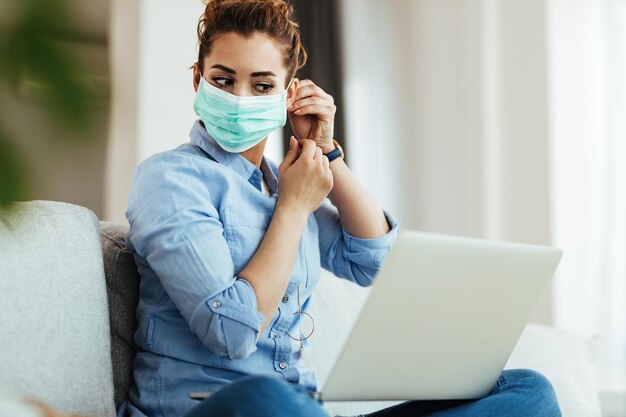

Deserted streets. Closed restaurants. Empty supermarket shelves. Alarming unemployment rates in the headlines. Supermarket announcements cautioning us to stay six feet apart. The new habit of wearing masks before entering public places. Mass graves in New York City. Decomposing bodies in rented trucks in New Jersey.
It feels like a scene from a dystopian movie, but it’s real, and we’re living it. We’re adapting to new ways of life.
Interestingly, some people say they are thriving in some aspects. We’re gathering on Zoom, connecting, meditating, and learning. We’re finding new ways to connect, experiencing stillness, reflecting, and contemplating life on a deeper level. We’re seeking meaning.
I’ve identified seven key lessons from this crisis that have been essential for me. (I’d love to hear what’s important for you.)
There are images of protests against stay-at-home orders in the news. Stories of large gatherings despite the associated health risks. Some people cherry-pick data to downplay the virus’s severity. These behaviors often seem like a refusal to acknowledge our vulnerability. It’s scary to admit that the virus is spreading and overwhelming healthcare systems and funeral homes. It’s unsettling to think a handshake or passing someone could lead to infection or death. Accepting that we might be infected and a danger to others is frightening. No wonder some people want to carry on as usual or deny the risk.
It takes courage to face these fears and uncertainties. There’s so much we don’t know, including the duration of this situation.
So, take a breath. Acknowledge your fear. Feel it but don’t let it control you. Denying it only leads to greater control over your life.
This situation is tough. Lives are disrupted. Many people have lost their jobs. Businesses in my town are closing permanently. I haven’t seen my kids in weeks because my partner is at high risk of exposure, making it too risky for them to visit. I’ve already lost a friend to this virus.
Despite these hardships, there’s always someone who has it harder.
Counting my blessings helps. I’m used to working from home and isolation as an introvert. I’m still working and able to pay rent, and I’m healthy.
Spend time each day thinking about what’s going well. Reflect on someone facing greater challenges. Count your blessings; you’ll find you have more than you thought.
Our sacrifices are saving lives. Wearing masks and maintaining distance prevent infections and save others. We might not show symptoms for several days while spreading the virus. These precautions are truly life-saving. Staying home and watching Netflix may seem trivial, but it’s a form of heroism and compassion.
Relate your discomforts to the bigger picture. You’ll look back and recognize that you saved lives. That’s significant, and you can feel good about it now.
Every action counts. Wearing a mask encourages others to do the same. Keeping a distance reinforces the importance of safety. Our actions either support or undermine social norms that save lives.
What we post on social media matters. Negative emotions spread faster on platforms like Facebook. Misinformation sticks in our minds more than corrections. Be mindful and careful about what you share. Fact-checking is a valuable practice.
This reminds us of our power. Conscious of this fact, we can act wisely and compassionately.
Many people, with disrupted routines and more free time, initially feel lost, bored, or confused but eventually find a greater sense of meaning and purpose. That meaning varies for everyone, but it often involves connecting, loving, serving others, creating, appreciating moments, growing, or learning.
Take time to reflect, read, and daydream. You’ll figure out what gives your life meaning.
There’s much suffering in the world, and ignoring it only leads to worse pain—disconnection and loneliness. Recognizing this suffering can foster compassion.
Suffering often makes us focus inward, but we can respond compassionately. Supporting and encouraging ourselves helps us open up to others’ suffering. Moving from self-compassion to compassion for others is transformative.
Compassion isn’t just a feeling but a desire to alleviate suffering. Feeling alone in our struggles intensifies pain. Supporting others during hard times eases their burdens. Simply expressing solidarity is powerful.
Reach out to friends and family. Check on them and listen. Show understanding and shared pain. Practical help, if possible, also makes a difference.
While millions lose their livelihoods and lives, the stock market soars. Billionaires grow richer. Essential workers in precarious conditions suffer the most. Inequalities are stark—some sail through the storm on luxury yachts while others cling to debris.
The world was already troubled before this crisis. We forgot that everyone matters.
We long for a return to normal, but the old normal wasn’t good. Let’s rebuild something better after this crisis.
We were never in control, and this situation teaches us to live day by day, with equanimity, avoiding quick judgments.
We don’t know what normal will look like post-crisis, and it won’t be the same as before. This likely won’t be the last pandemic, and our past successes gave us a false sense of security.